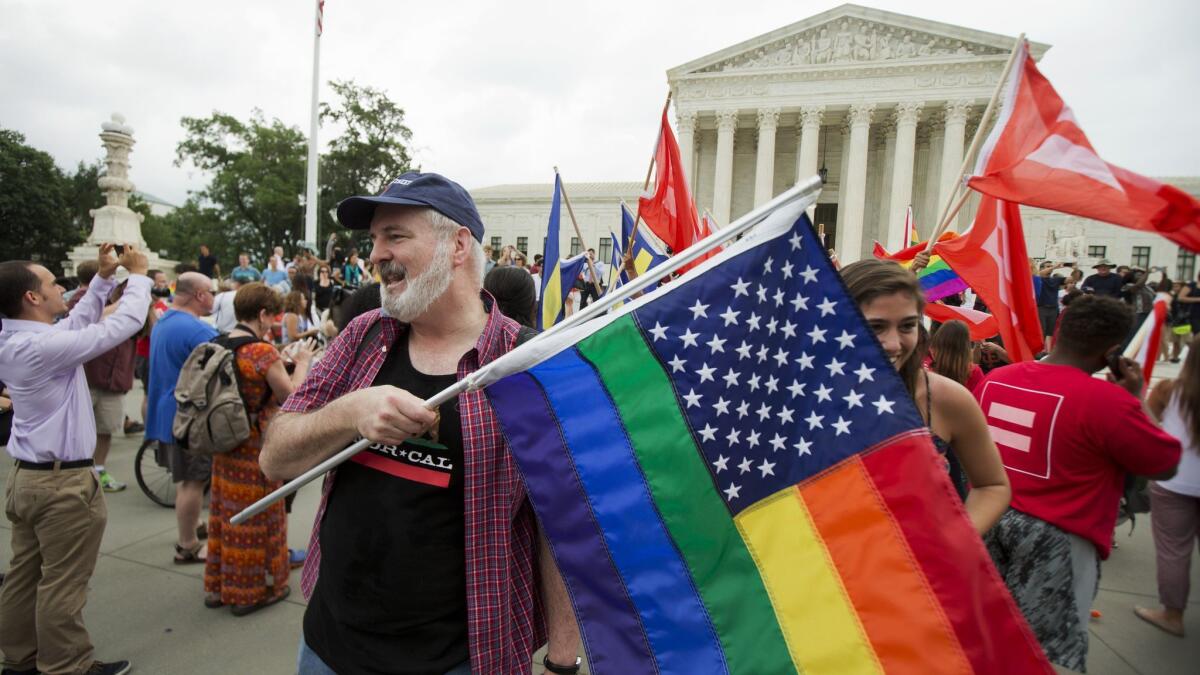Editorial: Bias against gay people is ‘sex discrimination’

- Share via
Efforts in Congress to protect gay men and lesbians from discrimination in the workplace have languished for years. But last week a federal appeals court in Chicago ruled that Congress already has made such discrimination illegal. That may sound like an audacious conclusion, but it’s the correct one.
In an 8-3 ruling, the U.S. 7th Circuit Court of Appeals held that Title VII of the 1964 Civil Rights Act, which bans job discrimination on the basis of “sex,” must also be read to prohibit discrimination on the basis of sexual orientation. The court ruled that Kimberly Hively, a part-time community college professor in Indiana, could pursue her claim that she was denied a full-time job because she was a lesbian.
In 1964, when Congress enacted Title VII, few if any members of Congress were thinking about discrimination against gay men and lesbians. The modern gay rights movement was in its infancy. But Chief Judge Diane Wood, writing for the majority, made a persuasive case that “sex discrimination” includes not just discrimination based on gender, but also discrimination on the basis of sexual orientation. Her legal analysis should be endorsed by the Supreme Court, which likely will have the final say on this issue.
First, Wood noted, that “in the years since 1964, Title VII has been understood to cover far more than the simple decision of an employer not to hire a woman for Job A, or a man for Job B. The Supreme Court has held that the prohibition against sex discrimination covers sexual harassment in the workplace, including same-sex workplace harassment; it covers discrimination based on actuarial assumptions about a person’s longevity; and it covers discrimination based on a person’s failure to conform to a certain set of gender stereotypes.
“It is quite possible that these interpretations may also have surprised some who served in the 88th Congress.”
Among the Supreme Court decisions Wood cited, one stands out: a 1998 case called Oncale vs. Sundowner Offshore Services. In that case, the Supreme Court ruled in favor of a male oil-rig worker who alleged that he had been the target of sexually oriented touching and rape threats from male co-workers.
The majority opinion in that case acknowledged that when Congress enacted Title VII, “male-on-male sexual harassment in the workplace was assuredly not the principal evil Congress was concerned with.” That’s an understatement. But the court added that “statutory prohibitions often go beyond the principal evil to cover reasonably comparable evils, and it is ultimately the provisions of our laws rather than the principal concerns of our legislators by which we are governed.”
The author of that majority opinion, some will be surprised to learn, was the late Justice Antonin Scalia. Scalia was renowned for subscribing to the notion that legal documents should be construed based on their text and “original meaning” — a philosophy also attributed to the justice who was sworn in to replace Scalia this week, Neil Gorsuch. Yet Scalia had no difficulty recognizing that a law against sex discrimination could cover situations not anticipated by the members of Congress who enacted it.
The dissenters in last week’s decision argued that extending Title VII’s ban on “sex discrimination” to discrimination against gay men and lesbians took flexible interpretation too far.
Judge Diane S. Sykes (who, like Gorsuch, appeared on a list of potential Supreme Court nominees released by the Donald Trump campaign last year), noted that when Congress wanted to target discrimination on the basis of sexual orientation it knew how to do so. For example, she noted, the Violence Against Women Act prohibits funded programs and activities from discriminating on the basis of both “sex” and “sexual orientation.”
But Wood convincingly countered that the law often protects the same interests in several different ways, what lawyers call a “belt and suspenders” approach. She also noted that some members of Congress may have been influenced by the fact that the Equal Employment Opportunity Commission, the agency responsible for enforcing Title VII, announced in 2015 that it regarded discrimination on the basis of sexual orientation as a violation of Title VII.
This page long has supported efforts in Congress to enact legislation making it explicit that it is illegal for employers to discriminate on the basis of sexual orientation and gender identity. But if the Supreme Court were to rule that such protection is afforded by Title VII, that would be an acceptable alternative path to justice. The 7th Circuit has shown the way.
Follow the Opinion section on Twitter @latimesopinion and Facebook
More to Read
A cure for the common opinion
Get thought-provoking perspectives with our weekly newsletter.
You may occasionally receive promotional content from the Los Angeles Times.









